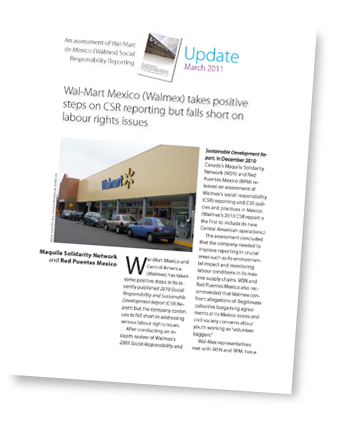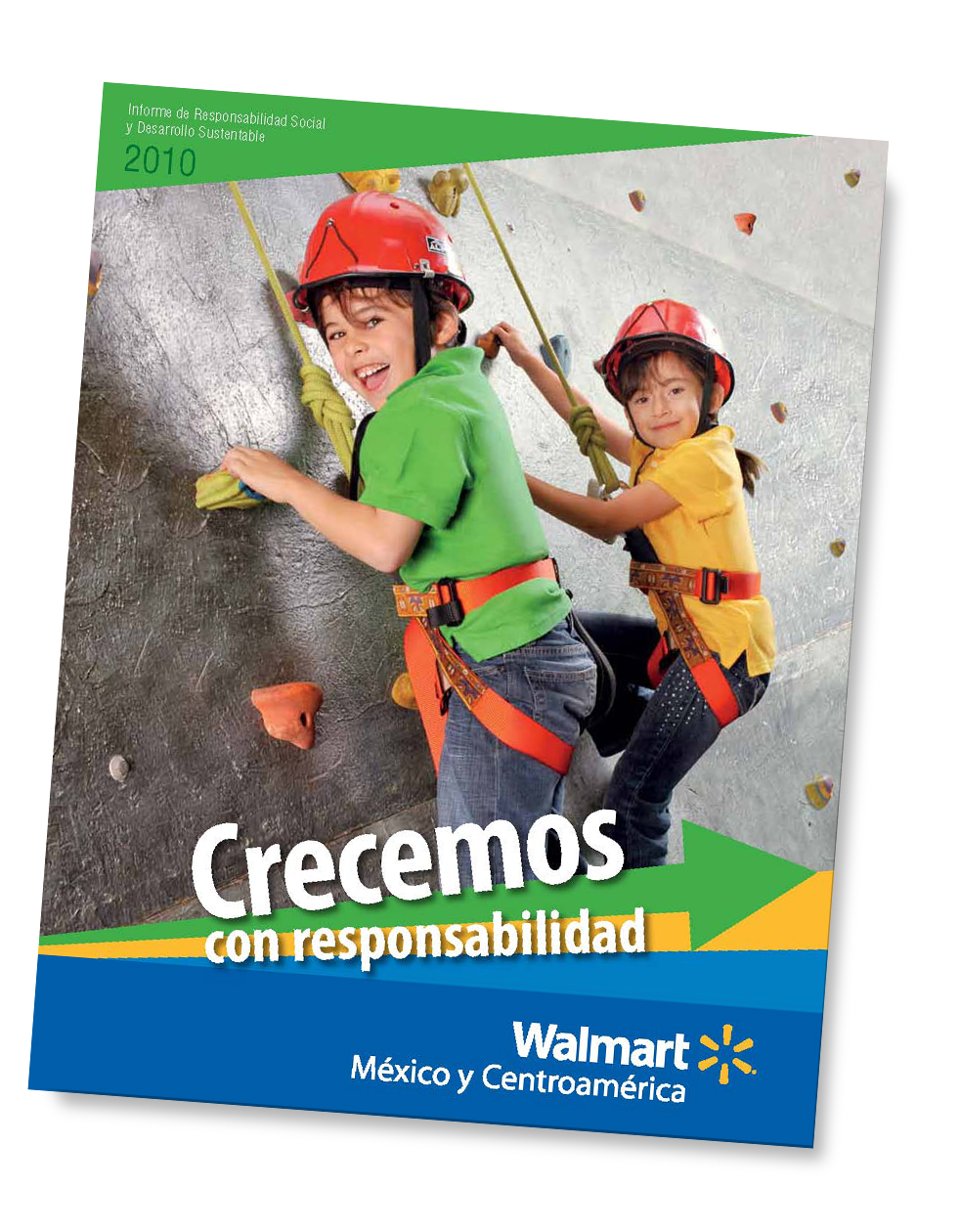WELCOME TO THE ARCHIVE (1994-2014) OF THE MAQUILA SOLIDARITY NETWORK. For current information on our ongoing work on the living wage, women's labour rights, freedom of association, corporate accountability and Bangladesh fire and safety, please visit our new website, launched in October, 2015: www.maquilasolidarity.org
March 14, 2011
 Wal-Mart Mexico and Central America (Walmex) has taken some positive steps in its recently published 2010 Social Responsibility and Sustainable Development Report (CSR Report) but the company continues to fall short in addressing serious labour rights issues.
Wal-Mart Mexico and Central America (Walmex) has taken some positive steps in its recently published 2010 Social Responsibility and Sustainable Development Report (CSR Report) but the company continues to fall short in addressing serious labour rights issues.
After conducting an in-depth review of Walmex's 2009 Social Responsibility and Sustainable Development Report, in December 2010 Canada's Maquila Solidarity Network (MSN) and Red Puentes Mexico (RPM) released an assessment of Walmex's social responsibility (CSR) reporting and CSR policies and practices in Mexico. (Walmex's 2010 CSR report is the first to include its new Central American operations.)
The assessment concluded that the company needed to improve reporting in crucial areas such as its environmental impact and monitoring labour conditions in its massive supply chains. MSN and Red Puentes Mexico also recommended that Walmex confront allegations of illegitimate collective bargaining agreements at its Mexico stores and civil society concerns about youth working as "volunteer baggers."
Wal-Mex representatives met with MSN and RPM twice to discuss drafts of the MSN-RPM assessment and its recommendations prior to the release of the final report. However while Walmex subsequently acted on some of the MSN-RPM recommendations on transparency, the company failed to address the recommendations regarding its labour practices and those of its suppliers, and its lack of effective engagement with civil society. Notably, since the MSN-RPM report was made public, the company has not responded to requests for follow-up meetings to discuss the report's recommendations.
Positive steps made in environmental reporting
Following recommendations made in the MSN - RPM assessment, Walmex has improved its environmental reporting. For example, Walmex:
Labour right issues, still a serious concern
Various Mexican studies have noted the presence of almost 200 "protection contracts" at Walmex stores in Mexico City. "Protection contracts" are collective bargaining agreements signed by an employer and a corrupt "official union" or lawyer without the knowledge and/or consent of the workers covered by the agreement. These agreements are designed to "protect" employers like Walmex from workers organizing or joining independent , democratic unions in order to negotiate better wages and working conditions.

If Walmex is genuinely committed to improving its CSR programs and public reporting, the company needs to go beyond the small, though laudable, reporting advancements it has made in 2010 and tackle the difficult and pressing issues being raised by civil society stakeholders.
MSN-Red Puentes recommended that Walmex ensure that all its workers are aware of the existence of any formal agreements with trade unions and have access to any agreements signed on their behalf. Walmex continues to be conspicuously silent on this issue, making no references to trade unions or collective bargaining agreements in the ten pages its 2010 Social Responsibility report devotes to Walmex employees.
Another area of concern identified by MSN and Red Puentes was the conditions under which over 22,000 youths between ages 14 and 16 work in Walmex's Mexican stores. The "volunteer" baggers receive no pay, other than tips they get from customers.
At least three Mexican studies have raised questions regarding Wal-Mex's use of youths as "volunteer" baggers. The issues of concern relate to the "volunteer" status of the baggers as well as deficiencies in compliance with a 1999 agreement between the Asociación Nacional de Tiendas de Autoservicio y Departamentales (ANTAD) and the Districto Federal (DF) government, which was intended to ensure the baggers' protection.
Mexican civil society organizations have raised concerns that the youths in the program are working more than six hour shifts, staying past 10 pm, and being required to purchase their own uniforms, all of which violate Mexican law and the terms of the Youth Bagger Program.
MSN and Red Puentes Mexico recommended that Wal-Mex address these civil society stakeholder concerns by initiating a transparent third-party investigation of the youth bagger program in order to determine whether it is being implemented in compliance with the 1999 agreement, whether the agreement is adequate, and whether the current program violates provisions of Mexico's federal labour law.
Walmex' 2010 CSR Report does not address these civil society stakeholder concerns on this issue, reiterating only that the company has unspecified procedures to ensure compliance with the terms of the program.
Supply chains grow faster than oversight
As one of the largest companies in Latin America, and the largest private-sector employer in Mexico, Walmex's practices can have a tremendous impact on working conditions in its extensive supply chains throughout the region.
Walmex's international parent company Wal-Mart Stores Inc. reported in 2010 that it had concerns about wages and employment practices in its supply chains in the Americas. In particular it pointed to the difficulty in determining if workers were being correctly compensated for their work.
Although Walmex added almost 3,000 suppliers in Mexico and another 6,000 suppliers when it expanded to Central America in 2010 - an increase of 50% in the number of suppliers - it reports that only an additional four suppliers were audited last year. Although - as recommended - Walmex now refers readers to additional online information regarding social compliance that was released by Wal-Mart Stores Inc., there is little information on the how Walmex audits were conducted, what issues were uncovered, or what corrective action, if any, was taken to deal with worker rights violations in its supply chain.
As Walmex further expands its retail presence and number of suppliers, it needs to articulate a policy and plan of action to ensure that all Wal-Mex suppliers are complying with labour and environmental laws, international Conventions and Declarations, and code of conduct standards, and to ensure that Wal-Mex's own buying practices support and promote social compliance and decent work at the supplier level.
If Walmex is genuinely committed to improving its CSR programs and public reporting, the company needs to go beyond the small, though laudable, reporting advancements it has made in 2010 and tackle the difficult and pressing issues being raised by civil society stakeholders.